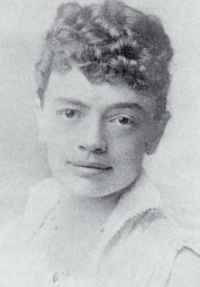Julia Keightley
ARTICLE UNDER CONSTRUCTION
ARTICLE UNDER CONSTRUCTION
Julia Wharton Lewis Campbell Ver Planck was married to Dr. Archibald Keightley. The Keightleys were active in the Theosophical Society in America, later renamed Theosophical Society, which was headed by Ernest Temple Hargrove in New York. She is best known for her writings under the pseudonym Jasper Niemand.
Early life
Julia Wharton Lewis Campbell was born into a distinguished Philadelphia family as the daughter of Judge James. W. Campbell.[1]
She married Philip William Ver Planck on December 21, 1871 at St. Stephen's Episcopal Church, Philadelphia, Pennsylvania. He died at the age of 32 on December 15, 1976, in Colorado.[2] They had two sons who died very young - James Campbell Ver Planck (1872 - 1875) and Gordon Ver Planck (1874 - 1875).
Involvement with Theosophical Society
Mrs. Ver Planck joined the Aryan Lodge (in New York City) of the Theosophical Society on May 27, 1886. Her membership in the Adyar-based Society ended on April 28, 1895 when most American lodges withdrew and formed their own American organization.[3]
Encounter with a Mahatma
After Mme. Blavatsky died, Mrs. Ver Planck had the following experience:
A few days after Madame Blavatsky died, HPB awoke me at night. I raised myself, feeling no surprise, but only the sweet accustomed pleasure. She held my eyes with her leonine gaze. Then she grew thinner, taller, her shape became masculine; slowly then her features changed, until a man of height and rugged powers stood before me, the last vestige of her features melting into his, until the leonine gaze, the progressed radiance of her glance alone remained. The man lifted his head and said, "Bear witness!" He then walked from the room, laying his hand on the portrait of HPB as he passed. Since then, he has come to me several times, with instructions, in broad daylight while I was busily working, and once he stepped out from a large portrait of HPB.[4]
Marriage to Archibald Keightley
Pseudonym
Mrs. Keightley wrote extensively under the pseudonym Jasper Niemand. Jasper means "master of the treasure" and Niemand is German for "nobody."
Writing
Jasper Niemand wrote numerous articles for Theosophical periodicals, including The Path, The Lamp, Lucifer, Theosophia, and Theosophical Quarterly. Union Index of Theosophical Periodicals lists at least 140 articles under that pseudonym.
- Letters That Have Helped Me. Mrs. Ver Planck compiled this volume as an exchange of letters between "Jasper Niemand" and William Quan Judge, who signed his as "Z."
- Sealed Instructions: An Original Comedy-drama in Four Acts, 1885. This play was performed at the Madison Square Theatre, according to Wikipedia. Credited to Mrs. Julia Campbell Ver Planck.
- The Wonder-Light and Other Tales. True Philosophy for Children London: Theosophical Publishing Company, 1890. Author Mrs. J. Campbell Ver-Planck. Dedication: "To the Lion Heart now known as Helena Petronovna Blavatsky this little book is offered by the author."
- The Vow of Poverty and Other Essays: And Other Essays, 1904.
- The Unity of Religions, 1908.
- The Sleeping Spheres, 1893-1899. This pamphlet about after-death states has a complex publishing history, but was first printed as a whole in 1953 by the The Canadian Theosophist. Available at spheres.pdf EasternTradition.org.
Other resources
- Autograph Letters Signed from Julia Wharton Lewis Campbell Ver Planck Keightley to Augustin Daly was published in 1885.
- Folger Shakespeare Library, Washington, D.C. has autograph letters from Mrs. Ver Planck to William Winter and Augustin Daly. Both concern her plays.
Notes
- ↑ William Benford Aitken, Distinguished Families in America, Descended from Wilhelmus Beekman and Jan Thomasse Van Dyke (New York: Knickerbocker Press, 1912), 139. Available as Google eBook.
- ↑ Philadelphia Inquirer (December 23, 1876), 4.
- ↑ Theosophical Society General Membership Register, 1875-1942 at http://tsmembers.org/. See book 1, entry 3646 (website file: 1B/21).
- ↑ A Casebook of Encounters with the Theosophical Mahatmas Case 62, compiled and edited by Daniel H. Caldwell
